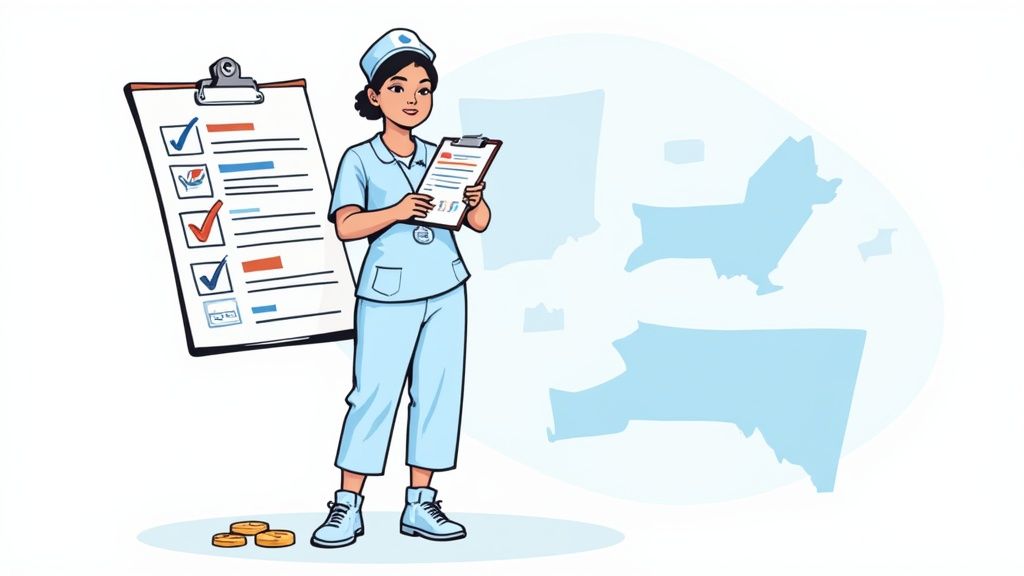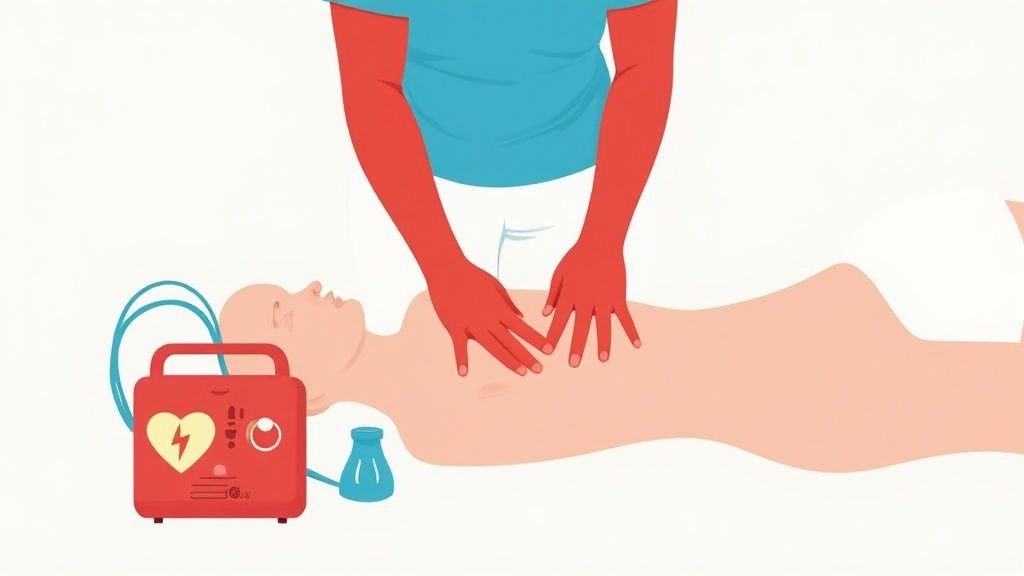Nursing License Renewal Requirements Made Simple

Renewing your nursing license is a non-negotiable part of your career. It involves a few key steps: meeting specific continuing education (CE) requirements, paying a fee, and submitting an application before your state's deadline. While the exact rules change from state to state, the core idea is the same. Most nurses have to complete a certain number of CE hours every renewal cycle, which is typically every two years. This whole process exists to make sure your skills stay sharp and patient care stays safe. This guide will help you navigate the process with confidence.
Why Keeping Your Nursing License Active Is Essential
Think of your nursing license as more than just a piece of paper—it's the very foundation of your career and a promise you make to every patient. The whole point of the renewal process is to ensure you remain competent, knowledgeable, and in sync with the latest standards in healthcare. It’s a system built to protect the public, verifying that every single practicing nurse maintains a high level of professional skill.
Letting your renewal slide isn't just an administrative headache; it can have serious consequences. Practicing with an expired license is illegal. It can lead to hefty fines, disciplinary action from your state board, and even cost you your job. Ultimately, this process is your professional responsibility, confirming your commitment to lifelong learning and, most importantly, patient safety.
The Core Components of License Renewal
While the specifics can differ depending on where you practice, the renewal process generally boils down to a few key areas. Each piece of the puzzle plays a role in verifying your continued competence and good standing in the profession.
Before diving into the details, here's a quick look at the main pillars of license renewal.
These components work together to create a system of accountability that benefits both the nurse and the public.
- Continuing Education (CE): This is the educational heart of it all. States mandate a specific number of CE hours to ensure you're up-to-date. Think new treatments, emerging technologies, and critical patient safety protocols.
- Application and Fees: A bit of bureaucracy is unavoidable. You have to formally apply for renewal through your state's Board of Nursing portal and pay the associated fee, which covers the administrative side of things.
- Professional Standing: Your application will likely ask you to confirm that you haven't faced criminal convictions or disciplinary actions that would impact your ability to practice safely.
This commitment to quality care isn't just a U.S. phenomenon. Nursing license renewal requirements across the globe reflect a shared dedication, though they can vary quite a bit by region. In the United States, most states require nurses to renew their licenses every 2 years, with the vast majority mandating a minimum number of continuing education units as a condition.
With all the documentation and charting that goes into maintaining an active license, finding ways to be more efficient is a huge help. You might find it useful to explore tools like dictation software for medical professionals. These kinds of technologies can help manage the administrative load, freeing up more of your valuable time for patient care and, of course, completing your CE.
Navigating Your Continuing Education Requirements
Continuing Education (CE) is the very heart of your nursing license renewal. Think of it as your ongoing commitment to staying sharp and ensuring your skills grow right alongside the ever-changing world of healthcare. These requirements are tracked using Continuing Education Units (CEUs) or contact hours, and each state's nursing board sets the specific number you need to hit during your renewal cycle.

The courses that count toward your renewal aren't just busywork; they're specifically chosen to make you a better, safer nurse. Many states even mandate certain topics that are critical for patient safety and professional integrity.
What Courses Count Toward Renewal
While a general refresher is always a good idea, most states get pretty specific about what they want to see in your CE log. These required topics ensure every nurse in the state is up-to-date on pressing public health and safety concerns.
You'll often find mandatory courses covering subjects like:
- Ethics in Nursing: Navigating those tough moral gray areas and upholding professional standards.
- Pharmacology Updates: Keeping track of new medications, tricky interactions, and updated guidelines.
- Patient Safety and Medical Errors: Focusing on the protocols that prevent mistakes and lead to better patient outcomes.
- Human Trafficking Awareness: Training nurses—often the first point of contact—to spot the signs and know how to respond.
- Implicit Bias Training: Helping us all recognize and address unconscious biases that can affect patient care.
A lot of CE requirements boil down to strengthening core nursing skills, like communication. To round out your learning, it's a great idea to bring in valuable patient education resources to help you connect with and empower your patients.
Why Online CE Is a Valid and Widely Accepted Option
There’s an outdated belief that only in-person classes, especially from organizations like the AHA or American Red Cross, are valid for license renewal. This is simply not true. Accredited online CE courses are not only accepted by state boards—they are now widely recognized and embraced by hospitals, clinics, and healthcare systems nationwide.
The industry is evolving. A growing body of peer-reviewed studies and industry articles supports the effectiveness of online education, highlighting that outcomes for knowledge retention and learner flexibility are often equal or superior to in-person formats.
Online platforms like ProMed Certifications are future-focused, providing a convenient, cost-effective, and high-quality path to meet your nursing license renewal requirements. Our accredited courses let you learn when and where it works for you, aligning with industry shifts without ever compromising the quality your career demands.
If you want to see what's out there, you can even find free continuing education units for nurses to get started.
The Shift Toward Online CE for Nurses
Ever wonder if those online CE courses really count toward your nursing license renewal? It’s a common question, but the answer is a firm and confident "yes." The healthcare world has fully embraced online education as a practical, legitimate, and frankly, super-effective way for nurses to stay sharp and meet their state board requirements.

The old-school belief that only in-person classes from specific providers like the AHA or Red Cross are valid is simply outdated. Think of it like this: accredited online CE isn't just a convenient backup, but a modern, high-quality solution that fits the demanding reality of a nurse's life and is just as effective as in-person training.
It’s Evidence-Based and Accepted by the Industry
This isn't just about convenience; the move to online learning is backed by solid research. Many peer-reviewed studies have demonstrated that online courses are just as effective—and sometimes even better—at helping nurses retain critical knowledge and improve patient care compared to traditional classroom settings.
The general consensus in the industry is shifting, with hospitals, clinics, and major healthcare organizations increasingly recognizing the value of high-quality, accredited online education. This growing acceptance cements its place as a powerful tool for professional development. If you still have questions about how it all works, our detailed guide on frequently asked questions about nursing continuing education credits can clear things up.
Finally, Flexibility for a Demanding Job
Let's be real: nursing is a profession of long shifts, family duties, and trying to squeeze in a personal life. Online CE is a game-changer because it gives you the flexibility to learn whenever and wherever you can.
- No More Commuting: You can complete courses during your downtime, whether that's on a quiet night shift or after the kids are in bed.
- Save Money: Online courses often cut out the extra costs of travel, parking, and printed materials that come with in-person classes.
- Learn at Your Own Speed: Get stuck on a tough concept? You can rewind, review, and make sure you truly understand the material before moving on.
This shift isn't just a nicety—it's essential for keeping our healthcare system staffed. With nursing shortages on the rise and a projected need for 177,440 more nurses by 2032, making license renewal accessible and efficient is critical. Flexible CE helps keep skilled, experienced nurses in the field where they're needed most.
This is exactly why ProMed Certifications is at the forefront of this change. We’re committed to quality education, delivering accredited, board-accepted courses that provide the convenience you need without ever cutting corners on the quality your career demands. Embracing online CE isn't just about checking a box; it's about investing in your professional future with a credible and practical approach to lifelong learning.
How Renewal Rules Vary From State to State
One of the most confusing parts of managing your nursing license is realizing the rules aren't the same everywhere. What works in California could be a world away from the requirements in Florida or Texas. There's no national standard, which means you absolutely have to check the specific rules from your own state’s Board of Nursing.
It’s a classic trap. You hear what a colleague in another state is doing and assume it applies to you, but following their lead could put your own license at risk. Each state gets to decide on its renewal cycle, how many CE hours you need, and even what specific topics you have to study. This patchwork of regulations can feel like a headache, especially if you're a travel nurse or thinking about moving.
Understanding Key State Differences
Let's get a clearer picture of just how different these rules can be. Some states keep their CE requirements pretty simple, while others require you to get training on specific public health issues that are important in their communities.
For example, one state might require:
- A two-year renewal cycle, while another runs on a three-year clock.
- 30 hours of continuing education, while the state next door only asks for 20.
- Mandatory courses on topics like human trafficking, implicit bias, or substance abuse prevention.
This is exactly why your state board's website needs to be your go-to resource. Relying on general advice is a recipe for non-compliance, which can lead to renewal delays and a whole lot of unnecessary stress.
This calendar-based infographic really drives home how much the dates and fees can vary, making it crucial to stay organized.

As you can see, there’s no universal deadline. It’s on every nurse to personally track down their state's timeline and budget for the costs.
A Look at State-by-State Requirements
To show you just how much things can differ, we've put together a quick comparison of a few states. This table highlights how the number of hours, renewal timelines, and even specific course mandates can change completely once you cross a state line.
Comparison of Renewal Requirements in Select States
As you can see, a nurse in one state might have total freedom in choosing their CE courses, while a nurse somewhere else has a strict list of state-mandated training to complete.
This isn't just a challenge for nurses working in the U.S. Healthcare is global, and international nurses have to navigate these same state-specific rules. In fiscal year 2024 alone, the U.S. got 24,733 applications for credential verification from nurses in other countries. You can read more about these nursing workforce statistics, but it shows the massive effort it takes to line up international qualifications with local state standards.
This is where modern online CE really shines—it cuts through the complexity. With a platform like ProMed Certifications, you get access to a huge library of state-approved courses you can take from anywhere. It ensures you can find and finish the exact training your specific state board demands, making compliance a whole lot simpler.
Your Step-by-Step License Renewal Checklist
Navigating your nursing license renewal can feel like a massive chore, but trust me, breaking it down into a simple plan makes all the difference. Think of this as your personal roadmap to getting it done on time and without the headache.
1. Find Your Renewal Deadline
This is the most critical piece of the puzzle. Your deadline is set in stone by your state’s Board of Nursing, and it is absolutely non-negotiable. Missing it means late fees, a lapsed license, and being legally unable to work.
Do yourself a huge favor: mark this date on every calendar you own, set a few phone reminders, and plan to get the ball rolling at least 90 days ahead of time. Procrastination is the number one enemy of a stress-free renewal.
2. Verify Your State’s CE Rules
As we’ve covered, nursing license renewal requirements are all over the map depending on where you practice. You have to go directly to your state’s Board of Nursing website. This is where you’ll find the exact number of CE hours you need and any specific, mandatory topics like human trafficking or updates in pharmacology.
Seriously, never just go by what a colleague in another state does. The only source of truth is your state board's official website.
3. Choose an Accredited CE Provider
Once you know the rules, it's time to find a provider. This is your chance to make a smart choice that actually fits your life. While trekking to in-person classes used to be the only option, things have changed for the better. Accredited online CE providers like ProMed Certifications offer top-notch, board-accepted courses that are just as effective.
That old-school belief that only in-person training from certain providers like the AHA or Red Cross counts? It’s simply not true anymore. The overwhelming majority of state boards and healthcare employers now fully recognize and accept accredited online education because it is just as good as in-person training. They value its flexibility and know it delivers equal, if not superior, quality.
Going with an online provider saves you a ton of time, offers significant cost savings, and lets you fit your learning into your already packed schedule. It’s how modern nursing professionals get it done.
4. Complete Your Courses
With your provider picked out, you can finally dive into the material. The real beauty of online CE is that you set the pace. If you want to power through everything in a single weekend, you can. If you'd rather spread it out over a few weeks, that works too. You’re in complete control.
5. Submit Your Application and Certificates
After you finish each course, download the certificate of completion immediately and save it in a dedicated digital folder. When you've got everything you need, head to your state's online renewal portal. This is where you'll submit your application, pay the fee, and upload your documents.
Take a minute to double-check every single field before you hit "submit" to avoid any frustrating processing delays. Follow these steps, and you’ll be in the driver's seat for your entire renewal, from start to finish.
Common Renewal Mistakes and How to Avoid Them
Even the most buttoned-up, organized nurse can hit a snag that throws their license renewal off track. We've seen it happen. Knowing where the common tripwires are is the first step to sailing through the process without any stress.
Let's break down the frequent slip-ups and, more importantly, how you can sidestep them completely.
One of the biggest mistakes—and it's an easy one to make—is accidentally taking courses from a provider that isn't properly accredited. Think about it: a quick search brings up dozens of online options, and many look perfectly professional. But if your state board doesn't recognize them, you've just wasted time, money, and precious CE hours that simply won't count toward your nursing license renewal requirements.
Another classic issue is miscalculating your CE hours or, just as bad, misunderstanding your state's specific topic mandates. It's not always enough to just hit the total number of hours. If your state requires a course on human trafficking or pharmacology and you miss it, your renewal can still be rejected.
Proactive Steps for a Flawless Renewal
A little bit of planning is all it takes to avoid that last-minute panic. Being proactive and paying attention to the details will make all the difference.
Always Verify Accreditation: Before you even think about enrolling in a course, head straight to your state’s Board of Nursing website. Check their list of approved providers. Reputable companies like ProMed Certifications are always transparent about their accreditations, but it's always smart to double-check with the official source.
Create a CE Checklist: The moment you know your state's rules, make a simple checklist. Note the total required hours and list out any mandatory topics. As you knock out each course, check it off. This simple habit keeps you on track and confident you're meeting every requirement.
Don't Wait Until the Last Minute: This is a big one. Give yourself a buffer of at least a month before your license expires. This cushion of time is your best friend if you run into any unexpected hiccups, ensuring you don't risk a lapse in your license.
Remember, your nursing license is one of the most valuable assets you own. Taking a few extra minutes to confirm the details is a small price to pay to protect your career and your ability to practice.
For a deeper dive into safeguarding your credentials, check out our guide on 5 tips for protecting your nursing license. Following this advice will help you get your renewal done right the first time, every time.
Your Top Renewal Questions, Answered
Let's be honest, the nursing license renewal process can feel like navigating a maze. A few common questions always seem to pop up. Getting clear, straightforward answers makes the whole thing less stressful and ensures you know exactly what to do when sticky situations arise.
What Happens if I Miss My Renewal Deadline?
Missing your deadline is a big deal. Your license will almost certainly become inactive or lapse. This isn't just a slap on the wrist—practicing with a lapsed license is illegal and can bring on serious disciplinary action.
The moment you realize you've missed it, your first call should be to your state board. They'll walk you through the reactivation process, which unfortunately almost always involves extra fees, more paperwork, and proof that you've finally completed your CE hours.
How Do I Get a Lapsed License Active Again?
Reactivating a license is a much bigger headache than a simple renewal. You'll have to formally apply for reinstatement through your state's Board of Nursing.
Expect to complete all the CE hours you missed, pay reinstatement fees (which are always higher than standard renewal fees), and you might even have to go through another background check. It's a process, so it's best to avoid it if you can.
Can I Use CE Hours From One State for Another?
Sometimes, yes. If you hold licenses in multiple states that are part of the Nurse Licensure Compact (NLC), the CE hours you complete for your home state often cover you in the other compact states. It's one of the big perks of the NLC.
However, it's not a universal rule. For any non-compact states, or if a particular state has unique mandatory courses (like a specific human trafficking or implicit bias course), you have to meet each state's individual rules. When in doubt, always double-check the requirements directly with each state board. It's the only way to be 100% sure you're compliant.
Ready to knock out your continuing education without the hassle? ProMed Certifications offers a full library of accredited online CE courses and certifications built to meet your state's specific requirements. Explore our courses and make your next license renewal a breeze.
.png)
Stay compliant with ProMed+
Certifications included: ACLS, BLS, PALS, CPR & Neonatal Resuscitation
Unlimited continuing education: over 200 hours of accredited CME
All-inclusive: One price. No surprises.
Get certified today





